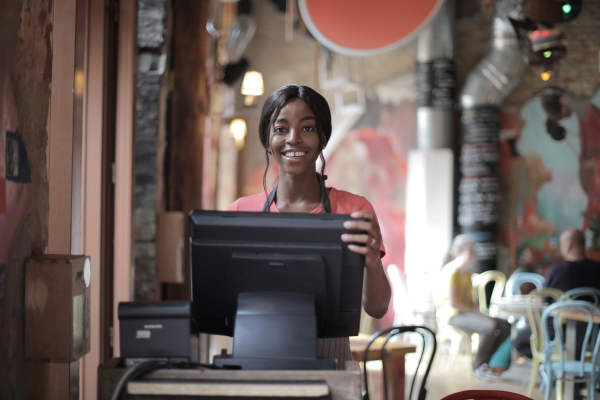Designing mobile training for hospitality
Now that you've decided to create mobile training for hospitality, you'll want to include these features in your content:

Hospitality as an industry has several features which make it unique in the world of employment. Hours are irregular, scope of work can be huge, health and safety issues are paramount, employee personality and background vary, and turnover is often very high. For those reasons, mobile training for hospitality is the ideal way to approach all training and onboarding in the industry.
When employees are trained in the conventional way, the speed at which training can be completed relies largely on both the trainees’ and the trainer’s availability, and usually requires time out from work. Because this can stretch the process out, it means employees are less efficient for an unnecessarily long period of time. It also means extra training and upskilling is put off to avoid inconvenience.
This is especially pertinent in hospitality, where inconsistent and irregular work schedules mean it can be hard to lock down suitable times for training sessions. Mobile training for hospitality, including onboarding, reduces the need for scheduling and means employees can complete their learning whenever it suits them at a more efficient pace.
Another issue that comes up in training for hospitality is that employees are required to be very flexible. They are often called on to perform various roles. You may have an employee going from the front desk to food service to coffee making, which means they need to be trained in all these tasks.
Using conventional training methods, this would take an impractically long time. As mentioned above, mobile training for hospitality is a more efficient way of covering such a broad range of information. On top of that, employees are sometimes asked to take on new tasks at short notice, and mobile training gives them immediate access to what they need to know.
Hospitality workers, more than many other workers today, need to be aware of the health and safety issues of their workplace. Not only is the hospitality industry the largest employer of young and inexperienced staff, there are many risks particular to the business. Lifting heavy things, using sharp or hot tools, doing repetitive work or standing for long periods, working in tight spaces, walking on wet or slippery floors .… There is also a risk in dealing with customers who may be under the influence of drugs or alcohol. For these reasons, employees must be well-versed in the OH&S rules and protocol of their company.
Not only does mobile training mean health and safety courses can be completed at their earliest convenience, employees also have access to the information if any questions arise. Perhaps more importantly, you can deliver amendments or new policies to workers immediately after any accident or problem.
The hospitality industry employs a wide range of people, of varied ages, backgrounds, education levels and ambitions. No one style of training is going to work for all your workers, even if you could get them all in the same room at once.

The benefit of mobile training in hospitality is that the course can be tailored to each learner without any additional investment. While they choose the speed at which they complete the course, the program can also include links to extra information for students who need help with certain concepts. You can also use a range of media, to cover all the different learning styles. Also the use of Intuto’s comments section means employees can seek extra help without slowing down other learners.
While mobile training for hospitality isn’t going to change the often transient nature of the industry, it can help alleviate the problems that produces. New workers are hired frequently, so conventional training programs need to be run often, which is expensive. Otherwise workers have to wait until enough people need the training to make it viable, which wastes their time and yours.
Also, by offering workers the opportunity to retrain and upskill, at no cost to you or them, you encourage loyalty to your business, which is rare in hospitality.
Next up: How to create the perfect mobile training course for hospitality!

Now that you've decided to create mobile training for hospitality, you'll want to include these features in your content:

It may seem counterintuitive, but hiring inexperienced employees and training them on the job can be good for your company.

Managers in the hospitality industry have difficult challenges to meet when it comes to employee retention, training, meeting high health and safety...